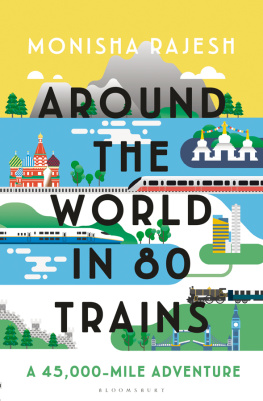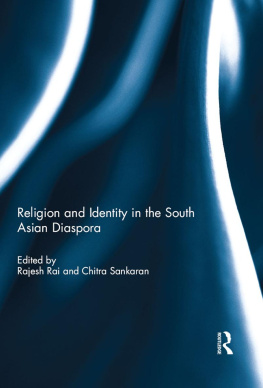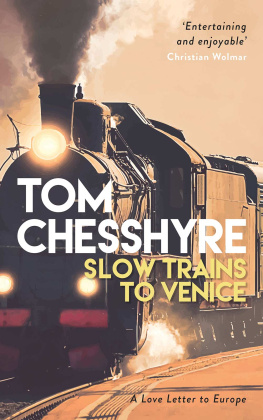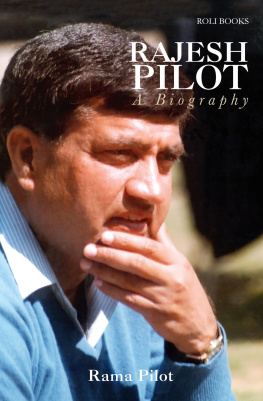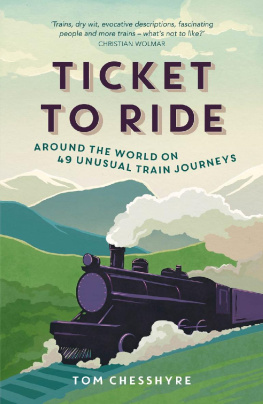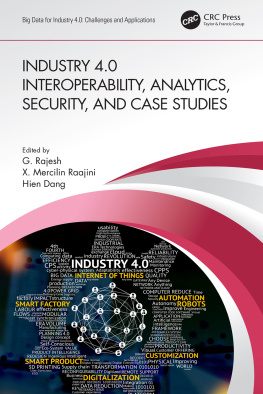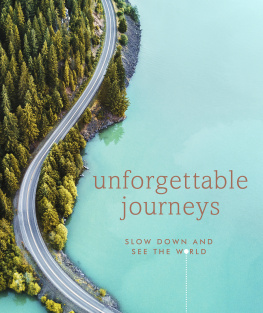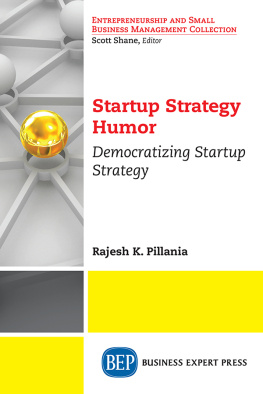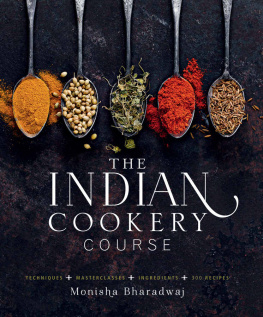
AROUND THE WORLD IN 80 TRAINS

BLOOMSBURY PUBLISHING
Bloomsbury Publishing Plc
50 Bedford Square, London, WC1B 3DP, UK
BLOOMSBURY, BLOOMSBURY PUBLISHING and the Diana logo are trademarks of Bloomsbury Publishing Plc
First published in Great Britain 2019
This electronic edition first published 2019
Copyright Monisha Rajesh, 2019
Monisha Rajesh has asserted her right under the Copyright, Designs and Patents Act, 1988, to be identified as Author of this work
For legal purposes the constitute an extension of this copyright page
All photographs are from the authors personal collection unless credited otherwise
All rights reserved. No part of this publication may be reproduced or transmitted in any form or by any means, electronic or mechanical, including photocopying, recording, or any information storage or retrieval system, without prior permission in writing from the publishers
Bloomsbury Publishing Plc does not have any control over, or responsibility for, any third-party websites referred to in this book. All internet addresses given in this book were correct at the time of going to press. The author and publisher regret any inconvenience caused if addresses have changed or sites have ceased to exist, but can accept no responsibility for any such changes
A catalogue record for this book is available from the British Library
Library of Congress Cataloguing-in-Publication data has been applied for
ISBN: HB: 978-1-4088-6975-8; eBook: 978-1-4088-6978-9
To find out more about our authors and books visit www.bloomsbury.com and sign up for our newsletters
For Ariel, without whom this book would have been published a year ago
Contents
In the days leading up to departure I often stared at my map covered in pins, strings, and scribbles, wondering what I was getting myself into. But my fears were soon allayed by the faith, support and endless enthusiasm from a circle of people who cheered me on from the moment I wrote my proposal until the morning the book went to print. To my brilliant agent, David Godwin, whose verve and spirit make this process an absolute joy, thank you for not laughing when I dropped in for a cup of tea and casually mentioned travelling around the world by train. Joining the Bloomsbury family has been a pleasure: my book has been loved and looked after in the safest of hands, particularly those of my editor Michael Fishwick who shares a thrilling obsession with dangling modifiers and without whom there would be far more descriptions of mucky toilets.
I owe overdue lunches to Professor Russell Goulbourne, Luke Doneghan, Shawna Pasquale and K. L. Kettle for their generous, patient editing, and to Adrian DEnrico for forgetting to thank him last time. Along the journey we were housed and fed by Katherine Lambropoulos in Cannes, Adam Benzine in Toronto, Sarah Richards in Vancouver, Melissa and Anand Preece in Los Angeles, Matt Malarkey in Washington D.C., Arun, Rosie, Sean, Maya and Sam Naidu in Seattle, and Jamie Fullerton, Adrian Sandiford and Hannah Oussedik Sandiford in Beijing much love and gratitude to you all. In addition, I am indebted to Azamat Abdullayev, Rod Beattie, Jean-Michel Filippi, Tomoko Maekawa, Hideo Nakamura, Professor Ulrike Roesler, Wade Shepard, Yuki Tanaka, Toshiko Yamasaki and Tetsushi Yonezawa for providing research, clarifying facts, arranging interviews, interpreting, and trusting me with their stories. A special thank you to Nick Bonner and Simon Cockerell at Koryo Tours for helping me in and most importantly out of North Korea, and to Sarah Davies and Geoffrey Cain for their guidance and expertise throughout the ten days.
It deeply saddens me that Sir Harold Atcherley passed away while I was still writing the book. His testimony, strength and unfailing good humour shaped my journey in a way I could never have imagined and I thank both him and Lady Sally Atcherley from the bottom of my heart for giving up their time and taking such delight in the book.
Marc Sethi deserves a gold medal. He and his flask of jasmine tea, sliders, and raucous laughter gave a much-needed boost to the final stretch and his beautiful photos capture moments in a way my words never could. Thank you for still talking to us. To my parents, Rekha and Rajesh, you embody the very essence of team work. Many thanks for your love, unflinching support and superior grandparenting skills. Jem read every chapter as I wrote it, helping me to relive an inimitable journey and make the book the best it could be; I couldnt have asked for a better travelling companion, editor, husband and papa to my little girl to whom this book is dedicated. Dear Ariel, the most wonderful writing distraction, please forgive me for spending the first nine months of your life hiding in a study so I could finish the book. But I hope one day when you read it, you will be inspired to have as many adventures of your own.
Leaning against the window, I looked up at the iron ribcage arched across the roof of St Pancras, blue sky blazing between its bones. It appeared to be rolling back, when I realised it was we who were moving. The 14.31 Eurostar to Paris hummed out of the station, and I sat back, warm spring sunshine flashing into the carriage. As London fell away, I tried to breathe in as much of the city as I could, hoping to hold it in my chest until we met again in seven months time. A long journey lay ahead, a journey that would take me around the world. Exactly five years ago to the day, Id stepped off the Charminar Express in Chennai, marking my eightieth train journey around India. With nothing but a three-month rail pass, an outdated map, and hopeless naivety, Id travelled 25,000 miles the circumference of the earth reaching the four points of the countrys geographical diamond. In between hanging from doorways, squatting on steps and snoozing on piles of laundry, Id come to understand why Indian Railways is known as the Lifeline of the Nation.
Having narrowly avoided a number of scrapes, Id sworn never to take on anything so ambitious again. Little did I know that the railways had followed me home their dust in my hair, their rhythm in my bones, their charm infused in my blood. Slowly, the symptoms began to manifest: Id linger on bridges watching freight thundering below. On warm afternoons, Id buy round-trip tickets just to sit in the window and read, and at night, Id lie awake listening to distant horns sound through the darkness. It became a sickness, one that had no cure. At least, no cure that Id find in London. I had to get back on the rails but I couldnt just pack up and leave. After returning from India Id eased back into the swing of London life, working as the subeditor at The Week magazine, and, by all accounts, the job was the stuff of dreams: I swanned in at ten oclock, and spent the day reading newspapers and drinking tea, with Coco the office dachshund asleep in my lap. In essence, I was being paid to do what most people did on a lazy Sunday. And now there was someone else to consider, my fianc Jeremy, who had proposed a few months earlier, next to a bin outside St Johns Wood tube station. Knocked out of the way mid-proposal by a group of Japanese tourists wearing waterproofs and wellies, he had asked me to marry him, in the rain, on the very spot where we had met for our first date.
Dismissing the idea of leaving, I carried on with the humdrum of daily life, suppressing the urge whenever it rose, until I finally gave up the fight: there was too much to discover on the rails, and the trains were waiting but not for long. Train travel is evolving at high speed: bullet trains are multiplying, long-distance services running out of steam. Sleeper services are being phased out, and classic routes fading away. According to economists and pessimists, the romance of the railways is dying a swift death, but I refused to believe it was true. Nowhere in the world could rival Indias railways, but I knew that every countrys network would possess a spirit of its own, it just needed a prod and a poke to unearth. Trains are rolling libraries of information, and all it takes is to reach out to passengers to bind together their tales.

